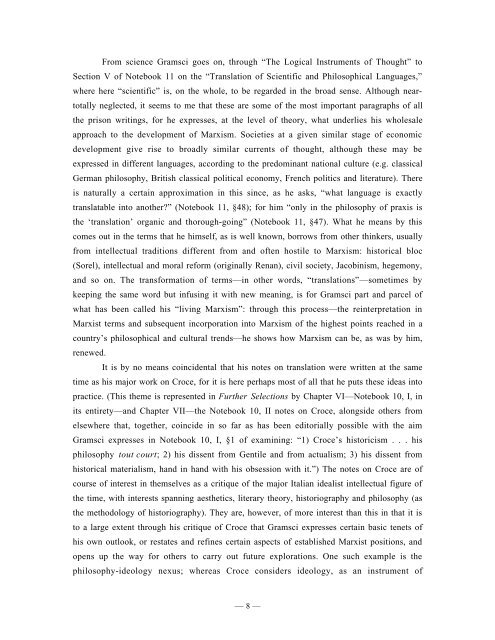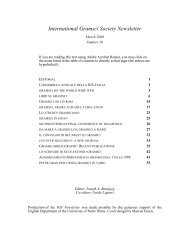Newsletter - International Gramsci Society
Newsletter - International Gramsci Society
Newsletter - International Gramsci Society
Create successful ePaper yourself
Turn your PDF publications into a flip-book with our unique Google optimized e-Paper software.
From science <strong>Gramsci</strong> goes on, through “The Logical Instruments of Thought” to<br />
Section V of Notebook 11 on the “Translation of Scientific and Philosophical Languages,”<br />
where here “scientific” is, on the whole, to be regarded in the broad sense. Although neartotally<br />
neglected, it seems to me that these are some of the most important paragraphs of all<br />
the prison writings, for he expresses, at the level of theory, what underlies his wholesale<br />
approach to the development of Marxism. Societies at a given similar stage of economic<br />
development give rise to broadly similar currents of thought, although these may be<br />
expressed in different languages, according to the predominant national culture (e.g. classical<br />
German philosophy, British classical political economy, French politics and literature). There<br />
is naturally a certain approximation in this since, as he asks, “what language is exactly<br />
translatable into another?” (Notebook 11, §48); for him “only in the philosophy of praxis is<br />
the ‘translation’ organic and thorough-going” (Notebook 11, §47). What he means by this<br />
comes out in the terms that he himself, as is well known, borrows from other thinkers, usually<br />
from intellectual traditions different from and often hostile to Marxism: historical bloc<br />
(Sorel), intellectual and moral reform (originally Renan), civil society, Jacobinism, hegemony,<br />
and so on. The transformation of terms—in other words, “translations”—sometimes by<br />
keeping the same word but infusing it with new meaning, is for <strong>Gramsci</strong> part and parcel of<br />
what has been called his “living Marxism”: through this process—the reinterpretation in<br />
Marxist terms and subsequent incorporation into Marxism of the highest points reached in a<br />
country’s philosophical and cultural trends—he shows how Marxism can be, as was by him,<br />
renewed.<br />
It is by no means coincidental that his notes on translation were written at the same<br />
time as his major work on Croce, for it is here perhaps most of all that he puts these ideas into<br />
practice. (This theme is represented in Further Selections by Chapter VI—Notebook 10, I, in<br />
its entirety—and Chapter VII—the Notebook 10, II notes on Croce, alongside others from<br />
elsewhere that, together, coincide in so far as has been editorially possible with the aim<br />
<strong>Gramsci</strong> expresses in Notebook 10, I, §1 of examining: “1) Croce’s historicism . . . his<br />
philosophy tout court; 2) his dissent from Gentile and from actualism; 3) his dissent from<br />
historical materialism, hand in hand with his obsession with it.”) The notes on Croce are of<br />
course of interest in themselves as a critique of the major Italian idealist intellectual figure of<br />
the time, with interests spanning aesthetics, literary theory, historiography and philosophy (as<br />
the methodology of historiography). They are, however, of more interest than this in that it is<br />
to a large extent through his critique of Croce that <strong>Gramsci</strong> expresses certain basic tenets of<br />
his own outlook, or restates and refines certain aspects of established Marxist positions, and<br />
opens up the way for others to carry out future explorations. One such example is the<br />
philosophy-ideology nexus; whereas Croce considers ideology, as an instrument of<br />
— 8 —



